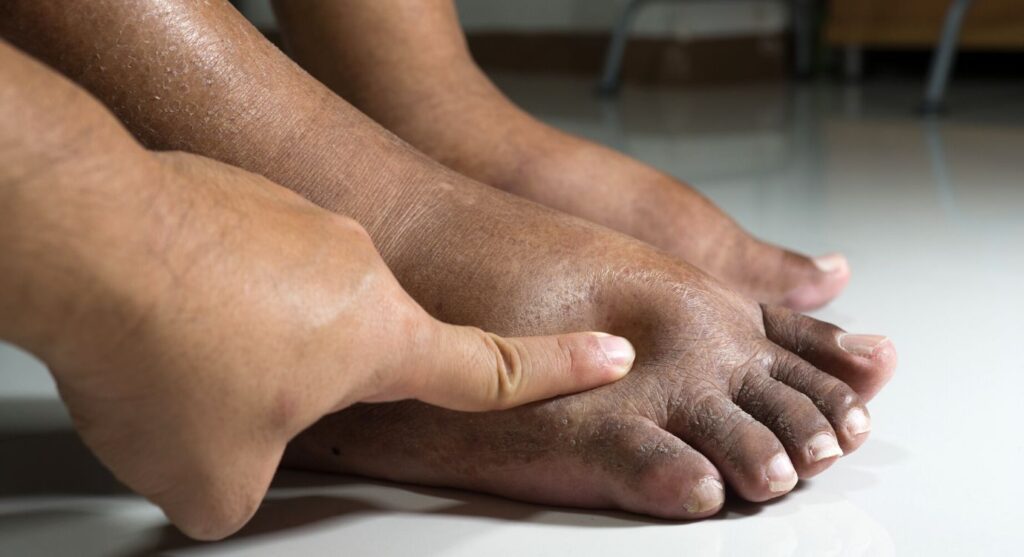Free delivery on all orders over £45
Free delivery on all orders over £45

Medically reviewed by
Ever noticed puffiness or swelling in certain parts of your body?
For many people – particularly women – water retention is considered an uncomfortable fact of life.
But it doesn’t have to be that way!
We’ve put together a guide detailing everything you need to know about using magnesium for water retention, including:
Let’s take a look.
Let’s start at the beginning.
Water retention presents as swelling in parts of the body. Otherwise known as Edema, the condition occurs when fluid builds up in body tissue. It’s most commonly experienced in our hands, legs, ankles, face and feet.
Water retention can be a sign of an underlying deeper problem, but most commonly is triggered by relatively everyday occurrences – for example, standing up or sitting down for too long or hormonal changes caused by pregnancy or PMS.
Read more: Magnesium in pregnancy
Why do we retain water in this way?
Well, our bodies are made up of between 50 and 60 percent water. If our hydration levels become unbalanced, our bodies try to hang on to that water – causing water retention and its associated symptoms.
So can magnesium help?
Yes – it is thought that magnesium can help reduce water retention by relaxing blood vessels and improving circulation to reduce fluid build-up in tissues.
Additionally, magnesium may support kidney function by helping to maintain proper electrolyte balance, increasing urine production and flushing out extra fluids.
While we don’t have swathes of evidence, there are preliminary studies that support the theory that magnesium may reduce water retention.
For example, one study conducted in 2013 found magnesium reduced water retention and bloating in participants.
There are also studies into the potential for magnesium to ease water retention as a PMS symptom, but more research is needed before any clinical conclusions can be drawn.
Read more: Magnesium for bloating

Due to the relationship between magnesium and the body’s fluid balance, many wonder if magnesium can actually cause water retention.
Research suggests that the potential for magnesium to cause water retention is minimal and that magnesium is far more likely to alleviate edema than cause it.
While there’s no consensus on which type of magnesium is best for water retention, we recommend choosing a form of the mineral with a high level of bioavailability.
This will ensure that the highest possible amounts of the active ingredient are absorbed into your system.
Of these, using magnesium citrate for water retention is one of the best options. Not only does magnesium citrate have excellent absorption, but it also helps attract and absorb water into the gut. Citrate is also one of the most well-researched and multifunctional forms of magnesium.
Other choices with high levels of bioavailability include

While there’s no specific ideal dose of magnesium for combating water retention, it’s really important to stick within the dosage guidelines of the product you’re consuming.
Most scientific studies consider the impact of dosages between 200mg and 400mg of magnesium per day. At the same time, the NHS website suggests magnesium supplementation is safe – so long as up to 400mg per day is consumed.
Taking a supplement daily is the best way to ensure you receive the most beneficial effects.
Read more: Best time to take magnesium
In a crowded supplements market, it can be challenging to know what to look for. Here are a few tips to help you choose a safe and healthy magnesium product:
Yes, magnesium can help reduce water weight, as it can counteract water retention and bloating.
No, magnesium doesn’t make you retain water – it does the opposite. Magnesium can be helpful for water excretion.
While there aren’t a ton of clinical studies available on the topic, preliminary evidence suggests magnesium can be effective in combating water retention. However, it’s really important that you also speak with a medical professional about your symptoms.
In most cases, water retention won’t be a sign of anything more serious. But it may be a symptom of a chronic condition or illness.
Regardless, it’s also a good idea to speak with a health professional before integrating a magnesium supplement into any health and wellness routine.
This powerful, multifunctional mineral can be excellent for your health but may not be the best fit for everyone and may impact the effectiveness of certain other medications.
Sign up for the Evopure newsletter:
This product is not for use by or sale to persons under the age of 18. It should not be used if you are pregnant or nursing. Consult with a physician before use if you have a serious medical condition or use prescription medications. A Doctor’s advice should be sought before using this and any supplemental dietary product. This product is not intended to diagnose, treat, cure or prevent any disease.
© Evopure Ltd. All rights reserved Terms & Conditions Cookie Policy Sitemap